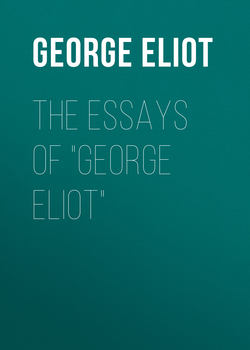The Essays of "George Eliot"

Реклама. ООО «ЛитРес», ИНН: 7719571260.
Оглавление
George Eliot. The Essays of "George Eliot"
PREFACE
“GEORGE ELIOT’S” ANALYSIS OF MOTIVES
THE ESSAYS OF “GEORGE ELIOT.”
I. CARLYLE’S LIFE OF STERLING
II. WOMAN IN FRANCE: MADAME DE SABLÉ. 1
III. EVANGELICAL TEACHING: DR. CUMMING. 4
IV. GERMAN WIT: HENRY HEINE. 10
V. THE NATURAL HISTORY OF GERMAN LIFE. 13
VI. SILLY NOVELS BY LADY NOVELISTS
VII. WORLDLINESS AND OTHER-WORLDLINESS: THE POET YOUNG. 15
VIII. THE INFLUENCE OF RATIONALISM. 16
IX. THE GRAMMAR OF ORNAMENT. 17
X. ADDRESS TO WORKING MEN, BY FELIX HOLT
Отрывок из книги
George Eliot is the greatest of the novelists in the delineation of feeling and the analysis of motives. In “uncovering certain human lots, and seeing how they are woven and interwoven,” some marvellous work has been done by this master in the two arts of rhetoric and fiction.
If you say the telling of a story is her forte, you put her below Wilkie Collins or Mrs. Oliphant; if you say her object is to give a picture of English society, she is surpassed by Bulwer and Trollope; if she be called a satirist of society, Thackeray is her superior; if she intends to illustrate the absurdity of behavior, she is eclipsed by Dickens; but if the analysis of human motives be her forte and art, she stands first, and it is very doubtful whether any artist in fiction is entitled to stand second. She reaches clear in and touches the most secret and the most delicate spring of human action. She has done this so well, so apart from the doing of everything else, and so, in spite of doing some other things indifferently, that she works on a line quite her own, and quite alone, as a creative artist in fiction. Others have done this incidentally and occasionally, as Charlotte Brontë and Walter Scott, but George Eliot does it elaborately, with laborious painstaking, with purpose aforethought. Scott said of Richardson: “In his survey of the heart he left neither head, bay, nor inlet behind him until he had traced its soundings, and laid it down in his chart with all its minute sinuosities, its depths and its shallows.”
.....
For example: “Examine your words well, and you will find that even when you have no motive to be false, it is a very hard thing to say the exact truth, especially about your own feelings – much harder than to say something fine about them which is not the exact truth.” That ought to make such a revelation of the religious diary-keeper to himself as to make him ashamed of himself. And this will fit in here: “Our consciences are not of the same pattern, an inner deliverance of fixed laws – they are the voice of sensibilities as various as our memories;” and this: “Every strong feeling makes to itself a conscience of its own – has its own piety.”
Who can say that the joints of his armor are not open to this thrust? “The lapse of time during which a given event has not happened is in the logic of habit, constantly alleged as a reason why the event should never happen, even when the lapse of time is precisely the added condition which makes the event imminent. A man will tell you that he worked in a mine for forty years unhurt by an accident as a reason why he should apprehend no danger, though the roof is beginning to sink.” Silas Marner lost his money through his “sense of security,” which “more frequently springs from habit than conviction.” He went unrobbed for fifteen years, which supplied the only needed condition for his being robbed now. A compensation for stupidity: “If we had a keen vision and feeling of all ordinary human life, it would be like hearing the grass grow and the squirrel’s heart beat, and we should die of that roar that lies on the other side of silence. As it is, the quickest of us walk about well wadded with stupidity.” Who does not at once recognize “that mixture of pushing forward and being pushed forward” as “the brief history of most human beings?” Who has not seen “advancement hindered by impetuous candor?” or “private grudges christened by the name of public zeal?” or “a church built with an exuberance of faith and a deficiency of funds?” or a man “who would march determinedly along the road he thought best, but who was easily convinced which was best?” or a preacher “whose oratory was like a Belgian railway horn, which shows praiseworthy intentions inadequately fulfilled?”
.....